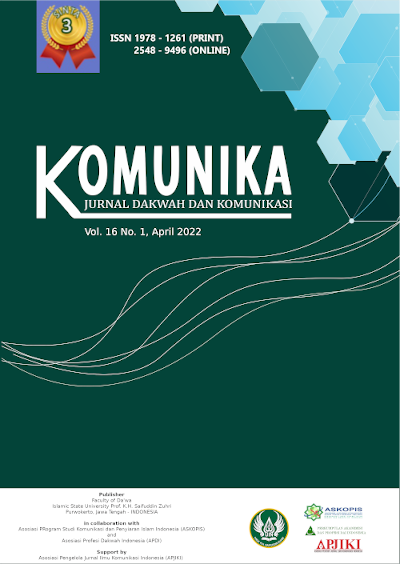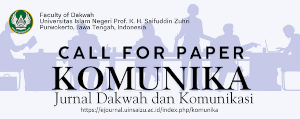Meme Creator Culture Production Arena on Facebook
DOI:
https://doi.org/10.24090/komunika.v16i1.4703Keywords:
Cultural production, habitus, cultural capital, memes, cultural intermediariesAbstract
Ace Anthem Universe is a meme community that focuses on producing video content. One way to distribute this content is through the Ace Anthem Universe fan page. The meme creators can assume cultural intermediaries because they can construct tastes for their consumers. However, it requires cultural, economic, social, and symbolic capital. This research aims to analyze the struggle of meme creators in the Ace Anthem Universe community to attain cultural intermediaries. This research uses the virtual ethnography method. The sampling technique used is purposive sampling. The data collection techniques use participant observation, interviews, and virtually studying cultural artifacts. Informants of this study are meme creators of the Ace Anthem Universe community. This study uses the concepts of habitus, arena, capital, and cultural intermediaries from Pierre Bourdieu. The results of this study explain that to penetrate the arena of meme culture, creators need smartphones as economic capital. In addition, knowledge as cultural capital is indispensable to obtaining symbolic and social capital in this arena. The capital obtained by meme creators becomes their capital to gain legitimacy as a cultural intermediary.Downloads
Download data is not yet available.
References
Berger, J., & Milkman, K. L. (2012). What Makes Online Content Viral? Journal of Marketing Research, XLIX, 192–205.
Bourdieu, P. (1984). Distinction: A Social Critique of the Judgement of Taste. Harvard: Routledge & Kegan Paul Ltd.
Bourdieu, P. (1991). Language and Symbolic Power. Oxford: Basil Blackwell Ltd.
Bourdieu, P. (1992). The Logic of Practice. Stanford: Stanford University Press.
Bourdieu, P. (1993). The Field of Cultural Production. US: Columbia University Press.
Bourdieu, P., & Wacquant, L. J. D. (1992). An Invitation to Reflexive Sociology. Oxford: Blackwell Publisher.
Cayari, C. (2011). The YouTube Effect: How YouTube Has Provided New Ways to Consume, Create, and Share Music. International Journal of Education & the Arts, 12(6), 1–28.
Denisova, A. (2019). Internet Memes and Society: Social, Cultural, and Political Contexts. New York: Routledge.
Digital 2020: Pengguna Internet Indonesia dalam Angka. (2020). Retrieved October 18, 2020, from https://cyberthreat.id/read/5387/Digital-2020-Pengguna-Internet-Indonesia-dalam-Angka
Frayssé, O., & O’Neil, M. (2015). Hacked in the USA: Presumption and Digital Labour. In O. Fraysse & M. O'Neil (Eds.), Digital Labour and Prosumer Capitalism The US Matrix (pp. 1–19). Hampshire, New York: Palgrave Macmillan.
Hine, C. (2015). Ethnography for the Internet: Embedded, Embodied, and Everyday. London, New Delhi, New York, Sydney: Bloomsbury Academic.
Ignatow, G., & Robinson, L. (2017). Pierre Bourdieu: Theorizing the Digital. Information, Communication & Society, 20(7), 950–966. https://doi.org/10.1080/1369118X.2017.1301519
Jenkins, R. (2006). Key Sociologists: Pierre Bourdieu. London and New York: Taylor & Francis.
Jiao, Y., Yang, J., & Xu, S. (2013). A Study of the Impact of Social Media Characteristics on Customer Adoption Intention of Social Media. In International Academic Workshop on Social Science (pp. 1095–1099). https://doi.org/10.2991/iaw-sc.2013.252
Kurniawan, B. (2017). Internet Meme: Memarodikan Peringatan Kesehatan Bergambar pada Bungkus Rokok (Studi Semiotika Meme dalam Budaya Digital). Universitas Gadjah Mada.
Lee, H.-K. (2012). Cultural Consumers as “New Cultural Intermediaries”: Manga Scanlators. Arts Marketing: An International Journal, 2(2), 131–143. https://doi.org/10.1108/20442081211274011
Maguire, J. S., & Matthews, J. (2010). Cultural Intermediaries and the Media. Sociology Compass, 4(7), 405–416. https://doi.org/10.1111/j.1751-9020.2010.00285.x
Mazambani, G., Carlson, M. A., Reysen, S., & Hempelmann, C. F. (2015). Impact of Status and Meme Content on Spread of Memes in Virtual Communities. An Interdisciplinary Journal on Humans in ICT Environments, 11(2), 148–164. https://doi.org/10.17011/ht/urn.201511113638
Moody-ramirez, M., & Church, A. B. (2019). Analysis of Facebook Meme Groups Used During the 2016 US Presidential Election. Social Media + Society, 1–11. https://doi.org/10.1177/2056305118808799
Murfianti, F. (2019). Meme di Era Digital dan Budaya Siber. Acintya: Jurnal Penelirian Seni Budaya, 11(1), 42–50.
Nasrullah, R. (2017). Etnografi Virtual Riset Komunikasi, Budaya, dan Sosioteknologi di Internet. Bandung: Simbiosa Rekatama Media.
Negus, K. (2002). The Work of Cultural Intermediaries and the Enduring Distance Between Production and Consumption. Cultural Studies, 16(4), 501–515. https://doi.org/10.1080/09502380210139089
Shifman, L. (2014). Memes In Digital Culture. Cambridge: The MIT Press.
Soha, M., & McDowell, Z. J. (2016). Monetizing Meme: Youtube, Content ID, and the Harlem Shake. In Social Media + Society (pp. 1–12). https://doi.org/10.1177/2056305115623801
Tellis, G. J., Macinnis, D. J., Tirunillai, S., & Zhang, Y. (2019). What Drives Virality ( Sharing) of Online Digital Content? Critical Role of Information, Emotion, and Brand Prominence. Journal of Marketing, XX(X), 1–20. https://doi.org/10.1177/0022242919841034
Bourdieu, P. (1984). Distinction: A Social Critique of the Judgement of Taste. Harvard: Routledge & Kegan Paul Ltd.
Bourdieu, P. (1991). Language and Symbolic Power. Oxford: Basil Blackwell Ltd.
Bourdieu, P. (1992). The Logic of Practice. Stanford: Stanford University Press.
Bourdieu, P. (1993). The Field of Cultural Production. US: Columbia University Press.
Bourdieu, P., & Wacquant, L. J. D. (1992). An Invitation to Reflexive Sociology. Oxford: Blackwell Publisher.
Cayari, C. (2011). The YouTube Effect: How YouTube Has Provided New Ways to Consume, Create, and Share Music. International Journal of Education & the Arts, 12(6), 1–28.
Denisova, A. (2019). Internet Memes and Society: Social, Cultural, and Political Contexts. New York: Routledge.
Digital 2020: Pengguna Internet Indonesia dalam Angka. (2020). Retrieved October 18, 2020, from https://cyberthreat.id/read/5387/Digital-2020-Pengguna-Internet-Indonesia-dalam-Angka
Frayssé, O., & O’Neil, M. (2015). Hacked in the USA: Presumption and Digital Labour. In O. Fraysse & M. O'Neil (Eds.), Digital Labour and Prosumer Capitalism The US Matrix (pp. 1–19). Hampshire, New York: Palgrave Macmillan.
Hine, C. (2015). Ethnography for the Internet: Embedded, Embodied, and Everyday. London, New Delhi, New York, Sydney: Bloomsbury Academic.
Ignatow, G., & Robinson, L. (2017). Pierre Bourdieu: Theorizing the Digital. Information, Communication & Society, 20(7), 950–966. https://doi.org/10.1080/1369118X.2017.1301519
Jenkins, R. (2006). Key Sociologists: Pierre Bourdieu. London and New York: Taylor & Francis.
Jiao, Y., Yang, J., & Xu, S. (2013). A Study of the Impact of Social Media Characteristics on Customer Adoption Intention of Social Media. In International Academic Workshop on Social Science (pp. 1095–1099). https://doi.org/10.2991/iaw-sc.2013.252
Kurniawan, B. (2017). Internet Meme: Memarodikan Peringatan Kesehatan Bergambar pada Bungkus Rokok (Studi Semiotika Meme dalam Budaya Digital). Universitas Gadjah Mada.
Lee, H.-K. (2012). Cultural Consumers as “New Cultural Intermediaries”: Manga Scanlators. Arts Marketing: An International Journal, 2(2), 131–143. https://doi.org/10.1108/20442081211274011
Maguire, J. S., & Matthews, J. (2010). Cultural Intermediaries and the Media. Sociology Compass, 4(7), 405–416. https://doi.org/10.1111/j.1751-9020.2010.00285.x
Mazambani, G., Carlson, M. A., Reysen, S., & Hempelmann, C. F. (2015). Impact of Status and Meme Content on Spread of Memes in Virtual Communities. An Interdisciplinary Journal on Humans in ICT Environments, 11(2), 148–164. https://doi.org/10.17011/ht/urn.201511113638
Moody-ramirez, M., & Church, A. B. (2019). Analysis of Facebook Meme Groups Used During the 2016 US Presidential Election. Social Media + Society, 1–11. https://doi.org/10.1177/2056305118808799
Murfianti, F. (2019). Meme di Era Digital dan Budaya Siber. Acintya: Jurnal Penelirian Seni Budaya, 11(1), 42–50.
Nasrullah, R. (2017). Etnografi Virtual Riset Komunikasi, Budaya, dan Sosioteknologi di Internet. Bandung: Simbiosa Rekatama Media.
Negus, K. (2002). The Work of Cultural Intermediaries and the Enduring Distance Between Production and Consumption. Cultural Studies, 16(4), 501–515. https://doi.org/10.1080/09502380210139089
Shifman, L. (2014). Memes In Digital Culture. Cambridge: The MIT Press.
Soha, M., & McDowell, Z. J. (2016). Monetizing Meme: Youtube, Content ID, and the Harlem Shake. In Social Media + Society (pp. 1–12). https://doi.org/10.1177/2056305115623801
Tellis, G. J., Macinnis, D. J., Tirunillai, S., & Zhang, Y. (2019). What Drives Virality ( Sharing) of Online Digital Content? Critical Role of Information, Emotion, and Brand Prominence. Journal of Marketing, XX(X), 1–20. https://doi.org/10.1177/0022242919841034

Downloads
Published
2022-04-30
Issue
Section
Articles
License
Copyright (c) 2022 Khairul Syafuddin

This work is licensed under a Creative Commons Attribution-ShareAlike 4.0 International License.
Authors who publish with this journal agree to the following terms:
- Authors retain copyright and grant the journal right of first publication with the work simultaneously licensed under a Creative Commons Attribution-ShareAlike 4.0 International License that allows others to share the work with an acknowledgement of the work's authorship and initial publication in this journal.
- Authors are able to enter into separate, additional contractual arrangements for the non-exclusive distribution of the journal's published version of the work (e.g., post it to an institutional repository or publish it in a book), with an acknowledgement of its initial publication in this journal.
- Authors are permitted and encouraged to post their work online (e.g., in institutional repositories or on their website) prior to and during the submission process, as it can lead to productive exchanges, as well as earlier and greater citation of published work (See The Effect of Open Access).
























